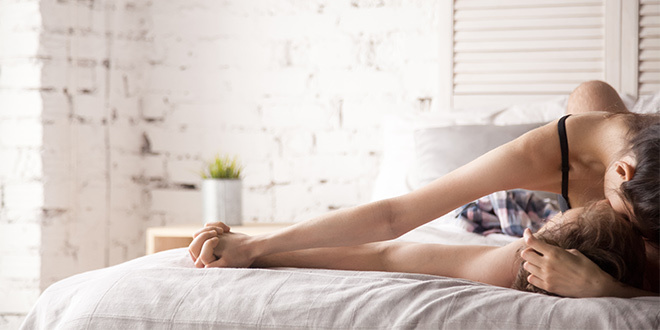It’s been a tough year for everyone. As lockdown measures look set to continue for the next few weeks at least, people are feeling the strain. The stress of living through a global pandemic has also been having a knock-on effect on people’s sex lives.
In the early days of the pandemic, it seemed to be people who were single that were suffering the worst as social distancing measures made it impossible to date, or even meet up with existing partners. Sex toy sales went through the roof as people started to (literally) take matters into their own hands. At least for awhile people were using the pandemic as an excuse (as we really needed one) to try out new things sexually, either with a partner or solo.

However, as we approach the anniversary of covid, the pandemic is starting to have a more complicated impact on our sex lives and our relationships more broadly, causing a sharp increase in break ups and divorces, as well as a lot of emotional upheaval and anxiety.
We spoke to certified sex educator and author of All The Fucking Mistakes: A Guide To Sex, Love, and Life, Gigi Engle, to see what’s going on and what people can do to feel better about their sex lives and themselves.
Sex drive isn’t actually a ‘drive’ and desire is experienced in different ways
The term ‘sex drive’ can be problematic and misleading, as it suggests our bodies are inherently ‘driven’ towards sex at all times, in the exact same way as other physical needs such as the one for food or sleep. This is not the case and thinking about sex in this way creates unrealistic expectations about how we ‘should’ feel,
“A drive is something you will die without,” explains Gigi. “and you won’t die without sex, although sometimes it can feel that way. This term is problematic because in general women and people assigned female at birth are less likely to experience a desire for sex like this. It creates a lot of unhelpful pressure.”
Gigi explains that a lot of people don’t properly understand the concept of responsive desire, which is desire that is sparked by something, rather than arising spontaneously (in the way we usually think of ‘sex drive’ – as horniness that just appears as if from nowhere). “Responsive desire can come from a lot of places,” Gigi explains. “For example, a lot of people notice they have more desire for their partners in the early days of their relationship, this is because our bodies are flooded with certain hormones when we’re excited by someone new, but it’s partly responsive desire too. We get dressed up to go for a date, spend that quality time together, and this creates an excitement for sex.”
Responsive desire can also be more unexpected than this, and sometimes can happen almost subconsciously. “Like you might see an eggplant at the supermarket, and that makes you think about sex, so you feel horny. It doesn’t always have to be something super obvious or in your face.”
Mix it up
With our lives being so samey lately, there are far fewer opportunities for responsive desire to occur. One way to counteract this is to try to mix things up and try new things. Whether you’re alone or with a partner, this could include trying out a new sex toy or new sexual position, or even just doing something different in the evening to unwind. Thinking about sex in new and exciting ways can help to spark responsive desire and break the monotony that can sometimes reduce our desire for sex.
People want sex for lots of different reasons
While some people have been experiencing lower libido in lockdown, others may have experienced an uptick in desire. This can create problems in relationships when a mismatched desire for sex leads one or both partners to feel anxious about themselves and/or the security of the relationship.
“Some people find sex to be a great reliever of stress, while others find they want sex less during stressful times,” Gigi explains. “At the same time, when one person needs sexual contact in order to feel connected to a partner, this can lead to problems.”
Gigi recommends learning about different kinds of desire, which can help partners to feel less pressured into wanting sex.
Sex and intimacy aren’t all about orgasm
We tend to have a very goal-focused approach to sex (in no small part because of mainstream porn) which puts orgasm as the ultimate aim of any sexual encounter. This can put a lot of pressure on as we make the mistake of thinking that sex that does not end in orgasm is somehow a ‘failure’. The catch-22 here is that, with that pressure in the back of our mind, we’re unlikely to relax enough to ever hope reaching orgasm. This in turn exasperates the anxiety, making the problem worse and worse.
If you’re single, you could try audio erotica to help you check back in with your sexy side.
Carving out some time for intimacy with a partner (which doesn’t need to be sex) is really important too. Gigi has some tips about how even people with really busy lives can do this. “It can be something small like watching one less episode of that thing you’re binging and instead just spend some time together, talking or cuddling. You might find this naturally leads to an increase in sexual intimacy too.”
Relax
A lot of the time we measure our sexual desires against unrealistic or arbitrary goalposts that do not properly represent the complexity of human sexuality, desire and intimacy.
Ultimately, the only person who can tell you how you feel is yourself. Check in with yourself, stay curious, keep educating yourself about sex, and do what feels right for you.
